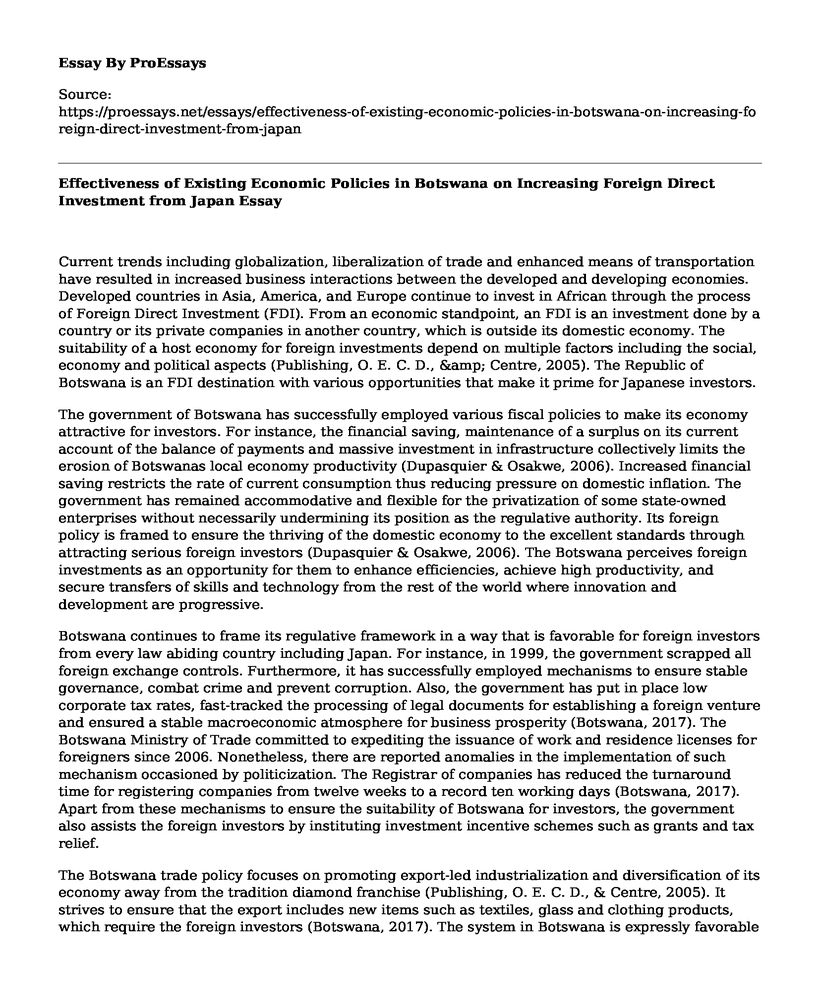Current trends including globalization, liberalization of trade and enhanced means of transportation have resulted in increased business interactions between the developed and developing economies. Developed countries in Asia, America, and Europe continue to invest in African through the process of Foreign Direct Investment (FDI). From an economic standpoint, an FDI is an investment done by a country or its private companies in another country, which is outside its domestic economy. The suitability of a host economy for foreign investments depend on multiple factors including the social, economy and political aspects (Publishing, O. E. C. D., & Centre, 2005). The Republic of Botswana is an FDI destination with various opportunities that make it prime for Japanese investors.
The government of Botswana has successfully employed various fiscal policies to make its economy attractive for investors. For instance, the financial saving, maintenance of a surplus on its current account of the balance of payments and massive investment in infrastructure collectively limits the erosion of Botswanas local economy productivity (Dupasquier & Osakwe, 2006). Increased financial saving restricts the rate of current consumption thus reducing pressure on domestic inflation. The government has remained accommodative and flexible for the privatization of some state-owned enterprises without necessarily undermining its position as the regulative authority. Its foreign policy is framed to ensure the thriving of the domestic economy to the excellent standards through attracting serious foreign investors (Dupasquier & Osakwe, 2006). The Botswana perceives foreign investments as an opportunity for them to enhance efficiencies, achieve high productivity, and secure transfers of skills and technology from the rest of the world where innovation and development are progressive.
Botswana continues to frame its regulative framework in a way that is favorable for foreign investors from every law abiding country including Japan. For instance, in 1999, the government scrapped all foreign exchange controls. Furthermore, it has successfully employed mechanisms to ensure stable governance, combat crime and prevent corruption. Also, the government has put in place low corporate tax rates, fast-tracked the processing of legal documents for establishing a foreign venture and ensured a stable macroeconomic atmosphere for business prosperity (Botswana, 2017). The Botswana Ministry of Trade committed to expediting the issuance of work and residence licenses for foreigners since 2006. Nonetheless, there are reported anomalies in the implementation of such mechanism occasioned by politicization. The Registrar of companies has reduced the turnaround time for registering companies from twelve weeks to a record ten working days (Botswana, 2017). Apart from these mechanisms to ensure the suitability of Botswana for investors, the government also assists the foreign investors by instituting investment incentive schemes such as grants and tax relief.
The Botswana trade policy focuses on promoting export-led industrialization and diversification of its economy away from the tradition diamond franchise (Publishing, O. E. C. D., & Centre, 2005). It strives to ensure that the export includes new items such as textiles, glass and clothing products, which require the foreign investors (Botswana, 2017). The system in Botswana is expressly favorable for investors who adhere to the legal provisions and identify with the principle and objectives of assisting in diversifying the economy. Furthermore, they have an obligation to uphold the practice of democracy, non-racialism, and intolerance to corruption.
References
Botswana. (2017). U.S. Department of State. Retrieved 7 May 2017, from https://2009-2017.state.gov/e/eb/ifd/2008/100829.htm
Dupasquier, C., & Osakwe, P. N. (2006). Foreign Direct Investment in Africa: Performance, challenges, and responsibilities. Journal of Asian Economics, 17(2), 241-260.
Publishing, O. E. C. D., & Centre, O. E. C. D. D. (2005). African Economic Outlook 2005. Paris: Organisation for Economic Co-operation and Development.
Cite this page
Effectiveness of Existing Economic Policies in Botswana on Increasing Foreign Direct Investment from Japan. (2021, Jun 14). Retrieved from https://proessays.net/essays/effectiveness-of-existing-economic-policies-in-botswana-on-increasing-foreign-direct-investment-from-japan
If you are the original author of this essay and no longer wish to have it published on the ProEssays website, please click below to request its removal:
- Influence of the Limits on Moped Rentals
- The Superior Capital Budgeting Methodology
- Should We Use Credit Cards? - Research Paper
- Maximizing Returns With Minimized Risk: Markowitz Portfolio Theory - Essay Sample
- Essay Sample on 2020 Rhodes Budget: Investing in Education & Basic Services
- Goldman Sachs Overpays for 1MDB Assets: Tanjong, Genting, and Putrajaya - Essay Sample
- Essay on Foreign Investment & Human Resource Development in China's Economic Growth







